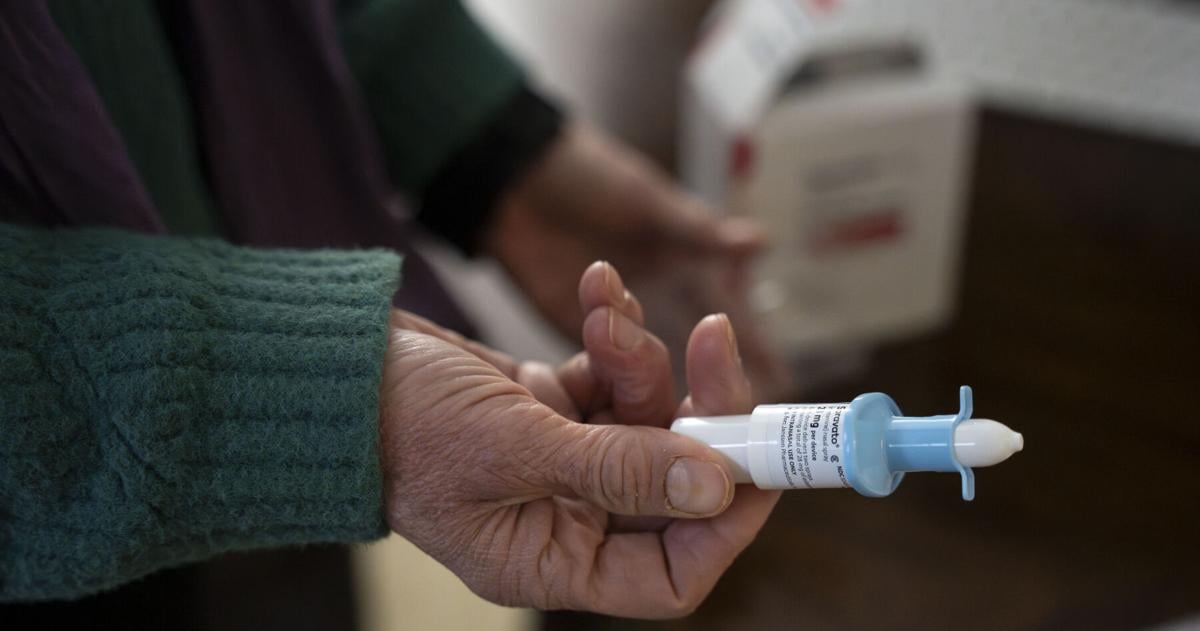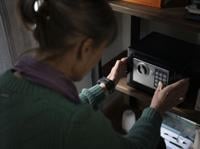When Sue Wolff is ready to start the journey, she draws the blinds to her windows overlooking Highway 89, converts her office couch into a bed and retrieves the drug from a safe in the corner of the room.
The medicine is sequestered in a nasal spray container and labeled Spravato, a form of ketamine.
Wolff is one of many providers across the country, including a handful in Jackson Hole, who have increasingly turned to ketamine to treat severe depression.
Julie Barnes, 64, is one of Wolff’s patients. She began taking Spravato in February, shortly after being pushed to leave her job with the federal government. At the time, she felt as though she had nothing left to offer the world.
A couple of nights were extremely difficult, Barnes said. She contemplated suicide.
“I sat down and just literally cried,” Barnes said. “I’m not much of a crier, but the uncontrollable kind of weeping, just like ‘I’m at my wits end, I don’t know what else to do, I don’t know where else to go from here.’
“I just didn’t want to be here any more,” she added.
Sue Wolff, a psychiatric nurse practitioner, examines the safe she stores the Spravato, an esketamine nasal spray, she uses to treat patients.
KATHRYN ZIESIG / NEWS&GUIDE
Help is available
If you or someone you know are in immediate danger of harming themselves, please call 911. If you or someone you know is having thoughts of suicide or is in emotional distress, contact the 988 Suicide and Crisis Lifeline by dialing 988 or visiting 988Lifeline.org.
Resources in the Teton area include Mental Health and Recovery Services of Jackson Hole’s 24-line at 307-733-2046, which people can dial if they or someone they love is in crisis. St. John’s Health’s Mental Health Resource Line can be reached at 307-203-7880 and thew Mental Health Coalition of Teton Valley can be reached at 208-354-6198.
Barnes called a suicide hotline and later reached out to Wolff, who had helped her treat depression years ago. The psychiatric nurse practitioner suggested Spravato.
Barnes was insecure during the first few ketamine sessions, unsure of what to feel. During the first session, she remembers feeling out of control — not in a way that made her feel as though she was in danger, but rather unable to connect her thoughts with her body.
“When I spoke to Sue, I just said ‘I don’t know about this. I can’t see how this is going to help,’” Barnes said after the first session. “But thankfully, we hung in there and did multiple sessions.”
Covered by a weighted blanket as thunderstorm sounds played in the background, Barnes continued ketamine treatment. She took note of the colors and shapes she saw, how her body felt and jotted her experience in a special journal as the effects of the drug wore off.
She credits the treatment with helping her understand that she had value and could contribute to the world.
“It changed the way I feel about my place in the world,” Barnes said. “I still have days when I’m kind of depressed and I’m down, but I want to be here. I want to thrive and be alive.”
Ketamine treatments — journeys, as providers call them — can be slightly different from patient to patient and provider to provider in Jackson Hole.
Spravato, the medicine Wolff administers, is the only ketamine drug approved by the Food and Drug Administration to treat depression. As far as she knows, she is the only provider in Jackson Hole who offers it. Providers elsewhere in the valley can, and do, prescribe ketamine off-label to address mental health.
Some Jackson Hole providers can only make room for a few patients. At least one clinic has all the clients it can handle. Recently, one provider has pulled back from offering the drug.
Dr. Bruce Hayse is one of a handful of providers in Teton County that will provide ketamine treatments.
REED MATTISON / NEWS&GUIDE FILE
The Jackson Hole Ketamine Clinic has treated around 300 patients since opening in 2020, 100 of whom are currently treated on a regular basis, according to nurse anesthetist Aimee Racette. She runs the clinic, which delivers ketamine through an intravenous infusion that feeds ketamine directly to a patient’s bloodstream.
Racette’s clinic is busy. She is currently not accepting new patients.
Physician Bruce Hayse and Hannah Meier, a psychiatric nurse practitioner, have turned to injectable ketamine shots.
“Ketamine, I think, is one of the really most beneficial things I do in terms of talking about improving people’s lives,” Hayse said.
Despite the promise, Gerard Sanacora, a professor of psychiatry at the Yale University School of Medicine who has studied ketamine for over a quarter century, cautioned against thinking of ketamine as a miracle cure. Instead, he said it should be used in conjunction with other mental health support, a guide that Jackson Hole providers agreed with.
“Ketamine, by itself, is probably not the treatment. Ketamine is part of a treatment plan,” Sanacora said. “If your level of depression is severe enough where you’re requiring ketamine treatments, you really should be having follow up with a mental health care provider.”
Health insurance companies generally cover Spravato, but off-label uses often fall to the patient.
Local providers say they’ve tried to ameliorate those costs, though the off-label treatments still cost hundreds of dollars per session.
The extent to which Jackson Hole’s wealth might influence its residents’ access to ketamine is unclear. Racette, for her part, said that most of her patients were workers and not affluent. Wolff said insurance can bring costs to around $10 for patients.
“The folks I’m helping and working with are the average person in Jackson, who are not overly wealthy,” Wolff said. “But they’re also going through insurance.”
Hayse believed there was “probably” a connection between wealth and people seeking ketamine treatment, but added that he didn’t see a socioeconomic stratification on the day to day.
“At least in my practice, I wouldn’t say there’s wealthy people doing it,” Hayse said. “I guess they are wealthy by American standards, not wealthy by Jackson standards.”
Outside experts believed that generally, ketamine prescriptions go up in wealthier places.
“These treatments tend to be provided much more, especially off-label, to people with greater affluence,” Sanacora said.
After over 25 years, Sanacora praised ketamine’s potential. Still, he pushed for keeping an eye on its use.
When Wolff treats patients with ketamine at her office in Jackson, she will covert her sofa into a bed, draw the blinds, play nature sounds and dims the lights. Patients can also use a blindfold and weighted blanket when undergoing treatment.
KATHRYN ZIESIG / NEWS&GUIDE
“I really do think it’s an amazing treatment. I’ve witnessed with my eyes, my own eyes, how it can be life-saving and really turn people’s lives around,” Sanacora said. “You really want to make sure that people are getting this treatment who could really benefit from it, but you also want to make sure that it’s not being overused.”
If you walk into a hospital, you should be able to find ketamine. That’s because the drug has been approved by the FDA as an anesthetic since the 1970s.
Over two decades ago, scientists — including Sanacora — realized that the drug might also be able to help treat depression. Though injectable and IV ketamine are not FDA approved to treat psychiatric conditions, providers can prescribe ketamine off-label to people who they feel might benefit from it.
That allows Hayse, Meier and Racette to treat patients with injections and IV ketamine. Hayse first started the injectable treatment after seeing a client — who didn’t respond to antidepressants, medicine or counseling — go to California and benefit from ketamine treatment there. He trained and learned about the drug, saying ketamine has since made a difference in his patients’ lives.
Lisa Smith-Batchen said she “couldn’t find a way out of the darkness” before starting ketamine treatment with Hayse. She credits the sessions, the last of which she had over two years ago, with saving her life.
“I tell the guy he saved my life,” Smith-Batchen said. “He says it wasn’t him who saved my life, I saved my own.”
Hayse said he initially restricted injectable ketamine treatment to patients with severe depression who had not responded to other treatments. He’s now expanded it to patients with anxiety, chronic pain and more.
Sanacora, the Yale expert, said the best and strongest efficacy data exists for intranasal Spravato for treatment-resistant depression. The further that providers stray from that, the less reliable the data, he added.
“Once you start going to one formulation or another formulation, once you start going to different dosing frequencies, once you start including other indications, other disorders, you’re just getting further away from where we have highly reliable data,” Sanacora said. “Not to say these other treatments don’t work, not to say they’re not safe, we just don’t really have good data.”
Ketamine hasn’t just shifted patient perspectives. Providers, too, have changed the way they think about the drug.
Wolff, the provider who treated Barnes, was initially skeptical of ketamine.
“I am a believer now in ketamine, post skepticism,” Wolff said. “But I also know that I don’t want someone to be reliant on that.”
Meier said therapy was “non-negotiable” for clients who she treats with ketamine. She likened ketamine to fertilizer. Though fertilizer could help a garden thrive, the garden would still need to be worked on every day.
Drew Ramsey, M.D. is a psychiatrist, author, farmer and founder of Spruce Mental Health. He is stepping away from ketamine treatments.
KATHRYN ZIESIG / NEWS&GUIDE
“My feeling with ketamine is ‘let’s give you this compost dump, this fertilizer dump into your brain,’” Meier said. “But if you’re not going to get in there and work it — that being going to therapy, doing sleep hygiene, drinking water, us working on your social connectedness — it can only take you so far.”
At least one local provider is setting their sights away from ketamine. Though psychiatrist Drew Ramsey offered about 100 “journeys” over a year and a half around 2022, he has only done two ketamine sessions this year.
“I’ve pulled away from it significantly,” Ramsey said.
Ketamine could be life-saving if dosed appropriately and into the right patient, Ramsey said. But he listed multiple concerns with ketamine treatment, including questions about overprescription and its efficacy. He also worried about research that suggests ketamine could be neurotoxic at high doses.
“I haven’t had a problem getting patients better without ketamine,” Ramsey said. “I think one of the concerns is that people are mistaking psychedelic medicine for good mental health clinical work. Psychedelic medicine is a procedure, but it’s not necessarily good mental health work.”
Ramsey praised Wolff for jumping through hoops to provide FDA-approved Spravato. He wondered, though, whether a town as small as Jackson needs such a breadth of providers.
“I think that Jackson is like a lot of towns where there’s a lot of access,” Ramsey said. “There are a lot of different players in the ketamine space here, way more than there should be given the population.”
In general, Sanacora worries about potential overuse or misuse. He wondered if providers may be causing damage to patients or society in a way experts are not yet aware of. The concerns are on the heels of the opioid epidemic, he said. Ketamine has the potential for abuse, he added, calling for making sure the drug was used responsibly.
“These are real risks. It doesn’t mean we should stop in any way, or we should be dramatically limiting availability,” Sanacora said. “I’m not saying that, but we really do need to stay aware that these risks do exist and not minimize them.”
Even as a patient, Barnes said that she does not see ketamine as an end all be all.
“I think that it works beautifully in conjunction with the other treatments: antidepressants, therapy,” Barnes said. “It’s like a recipe. You’re using all these different ingredients to create the end result.”
Barnes had her last treatment a few weeks ago. Moving forward, she feels that she is “okay” and that she doesn’t need ketamine. The door remains open for maintenance treatments if needed, she added.
“I would hesitate to recommend to anyone going in to receive ketamine treatments thinking that that was going to be the magic bullet,” Barnes said. “It’s not. It’s not. But it certainly is powerful.”
Patients can choose to wear a blindfold while receiving the Spravato treatment.
KATHRYN ZIESIG / NEWS&GUIDE






